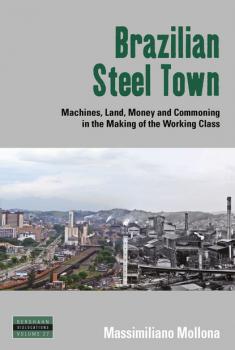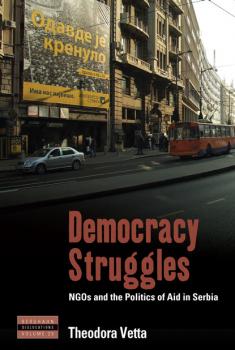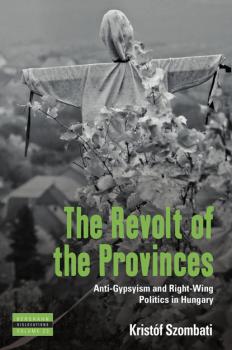ТОП просматриваемых книг сайта:
Dislocations
Скачать книги из серии DislocationsАннотация
Following the hidden lives of the global “1%”, this book examines the networks, social practices, marriages, and machinations of the elite in Pakistan. In doing so, it reveals the daily, even mundane, ways in which elites contribute to and shape the inequality that characterizes the modern world. Operating in a rapidly developing economic environment, the experience of Pakistan’s wealthiest and most powerful members contradicts widely held assumptions that economic growth is leading to increasingly impersonalized and globally standardized economic and political structures.
Аннотация
Informed by Eric Wolf’s Peasant Wars of the Twentieth Century , published in 1969, this book examines selected peasant struggles in seven Latin American countries during the last fifty years and suggests the continuing relevance of Wolf’s approach. The seven case studies are preceded by an Introduction in which the editors assess the continuing relevance of Wolf’s political economy. The book concludes with Gavin Smith’s reflection on reading Eric Wolf as a public intellectual today.
Аннотация
Volta Redonda is a Brazilian steel town founded in the 1940s by dictator Getúlio Vargas on an ex-coffee valley as a powerful symbol of Brazilian modernization. The city’s economy, and consequently its citizen’s lives, revolves around the Companha Siderurgica Nacional (CSN), the biggest industrial complex in Latin America. Although the glory days of the CSN have long passed, the company still controls life in Volta Redonda today, creating as much dispossession as wealth for the community. Brazilian Steel Town tells the story of the people tied to this ailing giant – of their fears, hopes, and everyday struggles.
Аннотация
Chinese citizens make themselves at home despite economic transformation, political rupture, and domestic dislocation in the contemporary countryside. By mobilizing labor and kinship to make claims over homes, people, and things, rural residents withstand devaluation and confront dispossession. As a particular configuration of red capitalism and socialist sovereignty takes root, this process challenges the relationship between the politics of place and the location of class in China and beyond.
Аннотация
Tracing the boom of local NGOs since the 1990s in the context of the global political economy of aid, current trends of neoliberal state restructuring, and shifting post-Cold War hegemonies, this book explores the “associational revolution” in post-socialist, post-conflict Serbia. Looking into the country’s “transition” through a global and relational analytical prism, the ethnography unpacks the various forms of dispossession and inequality entailed in the democracy-promotion project.
Аннотация
The past decades have seen significant urban insurrections worldwide, and this volume analyzes some of them from an anthropological perspective; it argues that transformations of urban class relationships must be approached in a way that is both globally informed and deeply embedded in local and popular histories, and contends that every case of urban mobilization should be understood against its precise context in the global capitalist transformation. The book examines cases of mobilization across the globe, and employs a Marxian class framework, open to the diverse and multi-scalar dynamics of urban politics, especially struggles for spatial justice.
Аннотация
The first in-depth ethnographic monograph on the New Right in Central and Eastern Europe, The Revolt of the Provinces explores the making of right-wing hegemony in Hungary over the last decade. It explains the spread of racist sensibilities in depressed rural areas, shows how activists, intellectuals and politicians took advantage of popular racism to empower right-wing agendas and examines the new ruling party's success in stabilizing an 'illiberal regime'. To illuminate these important dynamics, the author proposes an innovative multi-scalar and relational framework, focusing on interaction between social antagonisms emerging on the local level and struggles waged within the political public sphere.
Аннотация
In Serbia, as elsewhere in postsocialist Europe, the rise of “civil society” was expected to support a smooth transformation to Western models of liberal democracy and capitalism. More than twenty years after the Yugoslav wars, these expectations appear largely unmet. Frontiers of Civil Society asks why, exploring the roles of multiple civil society forces in a set of government “reforms” of society and individuals in the early 2010s, and examining them in the broader context of social struggles over neoliberal restructuring and transnational integration.
Аннотация
Located in the far-western Tarai region of Nepal, Kailali has been the site of dynamic social and political change in recent history. The Partial Revolution examines Kailali in the aftermath of Nepal’s Maoist insurgency, critically examining the ways in which revolutionary political mobilization changes social relations—often unexpectedly clashing with the movement’s ideological goals. Focusing primarily on the end of Kailali’s feudal system of bonded labor, Hoffmann explores the connection between politics, labor, and Mao’s legacy, documenting the impact of changing political contexts on labor relations among former debt-bonded laborers.
Аннотация
Based on fieldwork in Kinshasa and Paris, Breaking Rocks examines patronage payments within Congolese popular music, where a love song dedication can cost 6,000 dollars and a simple name check can trade for 500 or 600 dollars. Tracing this system of prestige through networks of musicians and patrons – who include gangsters based in Europe, kleptocratic politicians in Congo, and lawless diamond dealers in northern Angola – this book offers insights into ideologies of power and value in central Africa’s troubled post-colonial political economy, as well as a glimpse into the economic flows that make up the hidden side of the globalization.










